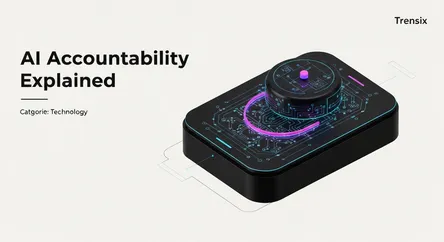Technology
AI Accountability Explained

Discover AI Accountability: the framework for ensuring artificial intelligence systems are transparent, fair, and answerable for their decisions.
What is it?
AI Accountability is the framework for ensuring artificial intelligence systems are answerable for their actions and outcomes. It establishes clear responsibility for an AI's decisions, especially when they cause harm. Key components include transparency, where AI processes are understandable (explainability); fairness, ensuring algorithms do not perpetuate societal biases; and robustness, meaning the system operates reliably. It answers the crucial question: who is responsible when an AI system makes a mistake?
Why is it trending?
The concept is gaining urgency as AI is deployed in high-stakes domains like healthcare, finance, and law. High-profile incidents of algorithmic bias in hiring and loan approvals have highlighted the potential for significant societal harm. In response, governments worldwide are developing new laws, such as the EU AI Act, to mandate accountability. This regulatory push, combined with growing public demand for ethical technology, has placed AI accountability at the forefront of tech policy discussions.
How does it affect people?
AI accountability directly impacts daily life by promoting fairness and safety in automated decisions. It helps ensure that AI-driven outcomes in job applications, credit scores, or medical diagnoses are equitable and not discriminatory. For individuals, it establishes pathways for redress if they are wronged by an automated system, giving them a right to an explanation and correction. Ultimately, robust accountability builds public trust, ensuring these powerful technologies are developed in a way that respects human rights and benefits society.